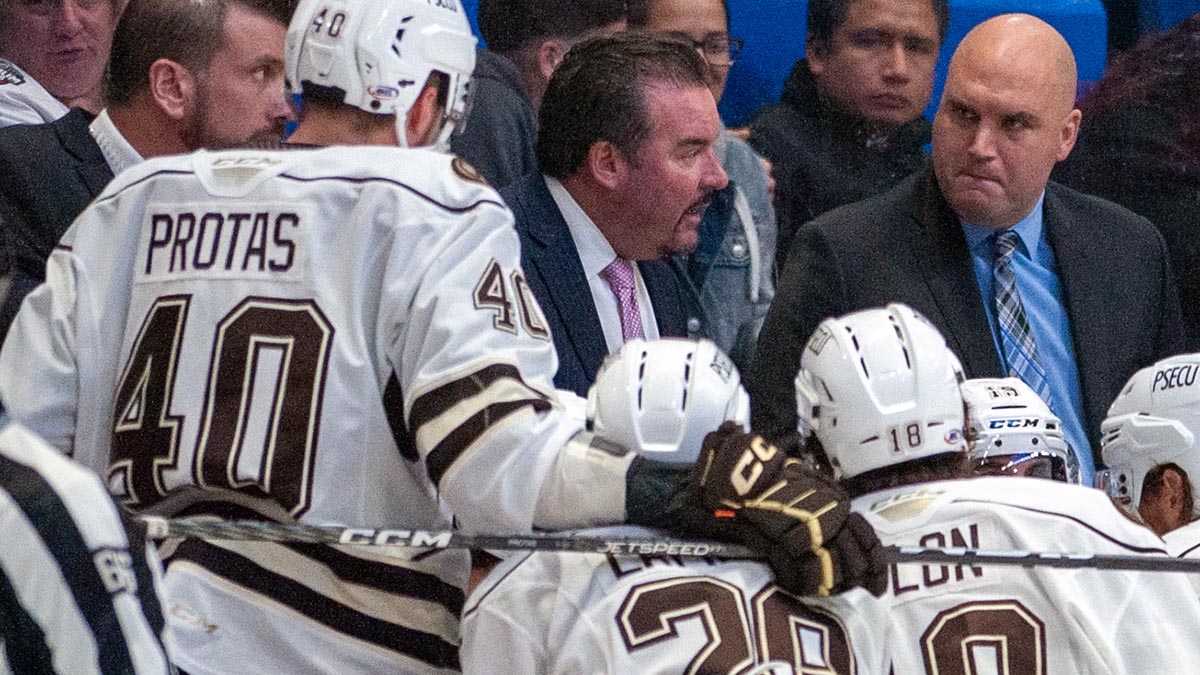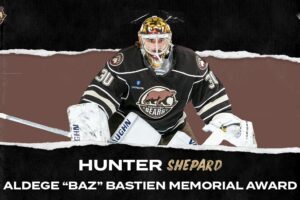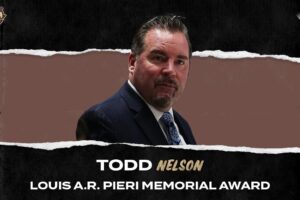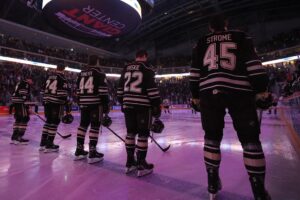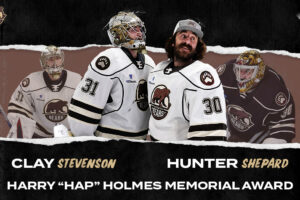📝 by Patrick Williams
If a hockey team eventually takes on the demeanor of its head coach, then the Hershey Bears have followed the axiom with Todd Nelson.
“He’s so poised,” said forward Sam Anas. “You look at him on the bench, and you wouldn’t know what the score of the game was. We could be down by two, up by two, and he’s just got that same calm, cool demeanor.
Back when the season started and Nelson was still new to most of his players, he said, “It’s my job to provide that leadership, and that’s very important because playoff time… if you have a bond with your team, have a family atmosphere, they don’t want the season to end, and they’ll go through the wall for each other. It’s my job to create that atmosphere.”
Well, he has, and now the poised, composed Bears are one win away from a trip to the Calder Cup Finals. Ahead three games to one on Rochester in the Eastern Conference Finals, they can finish the series tonight at Giant Center and continue their pursuit of the club’s 12th Calder Cup title.
Nelson is rather familiar with the Calder Cup himself. A long-time pro defenseman (including spending the 1995-96 season with Hershey), he has won the Calder Cup as a player (1994 with Portland), as an assistant coach (Chicago, 2008), and as a head coach (Grand Rapids, 2017).
Hired by the Washington Capitals to take over in Hershey after Scott Allen’s promotion to the parent club last summer, the organization wanted a winner to guide the Bears, and they got one in Nelson. Bears captain Dylan McIlrath played for Nelson on the Griffins’ 2017 championship team, and so the coach had a ready-made advocate with the Bears, though he hardly needed one. Nelson quickly won over his players and the demanding Hershey fan base both with wins and his matter-of-fact demeanor.
“I think he really understands how to gain respect from players without having to be too loud about it,” forward Beck Malenstyn said. “He comes into the rink and connects with you on a personal level.”
You will not hear yelling and screaming from the 54-year-old Nelson as a means to gain respect, either. He’s a bit old-school, a bit new-school, but most of all the Saskatchewan product is himself.
He does not have to be anything but himself, either, not with a successful coaching resume like his. In addition to being a head coach in Hershey, Grand Rapids and Oklahoma City, Nelson spent four seasons as an assistant with the Dallas Stars (including a trip to the 2020 Stanley Cup Final), and he finished the 2014-15 campaign as head coach of the Edmonton Oilers. He went to his third AHL All-Star Classic as a coach this past February, and his 353 regular-season wins rank him 13th in league history.
Make no mistake: Nelson is exacting. His practices can be particularly demanding. And while he does not critique his club publicly often, it can be rather pointed and therefore get his players’ attention when he does. A sloppy 6-5 shootout loss to Cleveland on Dec. 11 particularly irked Nelson, and he let his players know it quite clearly.
Said Nelson on that December night: “I’ll tell you one thing. Teams that are championship teams, they keep on playing, because they want more. That’s our goal here, to win [a Calder Cup]. But it’s human nature. Sometimes you think, ‘Okay, it’s going to be easy for the rest of the game,’ but it’s not. All you did is just wake up a lion.
“That’s a losing remedy for a first-round knockout. It really is. We have to overcome that, and that comes from within the room. Our leadership group has to hold the guys accountable and move forward.”
His players bought in, deciding that it might be wise to heed the words of the guy with three Calder Cup rings. And so off-nights like that soon became rare despite a grinding second-half schedule and a stretch-drive battle with Providence for first place in the Atlantic Division.
“He’s got that presence about him,” said forward Mike Vecchione, “where you can tell when he’s a little [ticked] off and serious. I think it’s a really good balance between the intensity and the fun and keeping things light out here. It’s been that way throughout the season, and he said we’ve got to earn that stuff or it doesn’t come.”
“He’s loose when he wants to be loose, and then I think we all have enough respect for him that when business time comes, we’re ready to go,” Malenstyn said.
“I’ve had a few coaches, but not too many, that have that presence where they don’t need to scream and yell at you. You’re willing to put yourself on the line for them, because they let you go out there. They let you play your game. But if things start to slide, they hold you accountable. I think he has a great balance of that, where he keeps it light around the room and then when push comes to shove and it’s business time, we’re locked in, and we’re prepared.”
Nelson’s Bears have centered their success around excellent defensive play and a workmanlike, grinding approach to the game nightly. Hershey has allowed just 1.91 goals per game this postseason, and has stymied the potent Rochester offense in winning the last three games of their series. The Bears have followed the same approach that earned them the second-best record in the Eastern Conference in the regular season when they surrendered only 2.56 goals per game, second-best in the AHL.
Such an approach requires commitment — and consistent commitment, at that — from up and down the Hershey roster and is the product of Nelson’s demands.
Then again, Nelson’s low-key personality does not mean that he cannot cut loose. He has allowed himself to indulge his players in the team’s post-game victory celebrations that feature a costume bear’s head, much to their amusement. There was a team golf outing during the 12-day break between the end of the regular season and the start of the Atlantic Division semifinals against Charlotte back in April. Nelson got to know his players as people quickly in training camp, including a get-to-know-you barbecue that Nelson put on for his players and their significant others.
More of that personality came out when Nelson arrived by motorcycle last Oct. 15 for the Bears’ home opener.
This is also a veteran Bears club with strong leadership — and personalities — that does not need a lot of hand-holding. Once the dressing room had won Nelson’s trust, he had the good sense to know when to ease up on his players and when to demand more.
Take Monday night in Rochester. It was 2-0 at the second intermission of Game 4, and the Bears were not the team ahead, despite controlling much of the play and pace for those first two periods.
And the Amerks made a push early in the third period, too. Nelson stayed calm, though, and slowly the Bears’ size and brawn wore down Rochester. They kept winning puck battles, including one that set up Lucas Johansen’s goal midway through the third period. Two minutes later it was rookie Ethen Frank, a healthy scratch in Game 3, who unleashed a long right-side shot that Amerks netminder Malcolm Subban kicked to the opposite boards. Mason Morelli won control of the puck and moved it to Connor McMichael, whose pass to the slot found Logan Day for a shot past Subban.
Make it a 2-2 game.
Then Morelli won another battle, this one in front of the Rochester net, and jabbed a rebound past Subban. An empty-net goal later, the Bears had themselves a 4-2 win and a nice bus ride back to Hershey with a chance to end this series tonight and send the Bears to the Calder Cup Finals for the first time since 2016.
The mutual trust between a coach and his players has been built through nearly eight months together. That was Nelson’s goal when he came to Hershey, part of a coaching package that he terms both the “art and science” of the profession. He long ago put in place the science, the systems play that has made the Bears such a successful shut-down club. When needed against Rochester, he made further adjustments that have bottled up the Amerks’ speed.
The art? That takes time, but it is blossoming now as the calendar nearly turns to June.
“How do you get these guys to buy in?” Nelson asked. “How do you get these guys to become a family? How do you get these guys to play hard for each other?”
With lots of patience, communication, honesty, and direct talk. Nelson built that relationship with his players, got that buy-in from his group, and now they all are seeing the payoff.
“You know exactly what he’s saying,” Anas explained. “He doesn’t beat around the bush, and he says how it is. It’s something that guys appreciate, and guys want to play for someone with his resume.
“We really respect him.”
TheAHL.com features writer Patrick Williams has been on the American Hockey League beat for nearly two decades for outlets including NHL.com, Sportsnet, TSN, The Hockey News, SiriusXM NHL Network Radio and SLAM! Sports, and was most recently the co-host of The Hockey News On The ‘A’ podcast. He was the recipient of the AHL’s James H. Ellery Memorial Award for his outstanding coverage of the league in 2016.

































